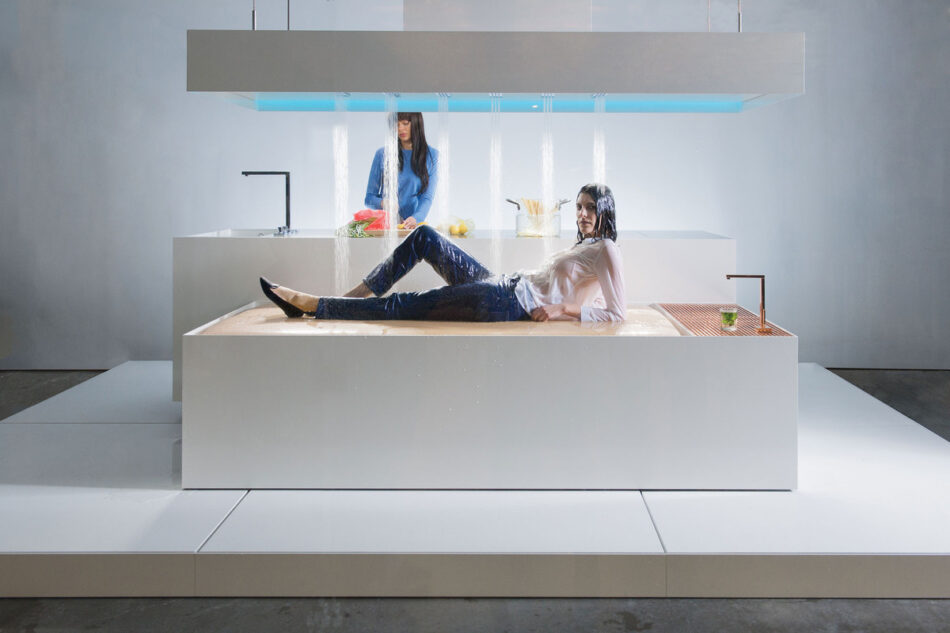Renotopia
Utopia is alive and well; it’s just gotten very small. The utopian art of our time is the kitchen or bathroom renovation—renotopia. Renotopia is the dream that if we could just rip everything out and start again, the perfect world might indeed come into being—if one could just get the appliances and the finishes right. Renotopia is a small but perfect world.
Utopia is often imagined as a separate world where perfection is achieved, where harmony reigns and time stops. It can be either a system that tries to account for everything, or a momentary flash of hope.
But there is another way to think about utopia; it’s not an idealistic form, but a very realistic one—a rigorous thinking through of everyday life. Utopia is the genre that pushes realism to the limit. If one compares the utopian writings of Charles Fourier to the bourgeois novel, it is Fourier who has a better grip on reality. He asks questions the novel usually doesn’t, such as: who takes out the trash?
Today, utopia is living in your bathroom or kitchen. These two places are built on one of the truly great, realized utopias: running water and sewerage, not to mention gas and electric. The great socialist utopia that actually got built is service infrastructure. Yet as I write this, people in the city of Baltimore have had their water cut off. It’s a reminder of how imperfectly distributed this utopia was and is, even in the United States.
If there’s a core characteristic of renotopia, it is a denial of the necessity for large, infrastructural utopias as foundations for the private ones of kitchen and bathroom. Renotopia is the dream of a civilization in retreat.
The problem becomes one of how to live the good life. Let’s renovate! Let’s rip out those ugly kitchen cabinets and be done with that leaky shower! Utopia is an impulse that comes of surplus. But how far can that impulse go in a civilization in decline? Only as far as the bathroom fixtures.
Utopias always involve boundaries—the lines that keep chaos and violence at bay. The bathroom and kitchen have faucets and switches to manage all the boundaries, whether of solids, liquids, or gases. These are the zones that have the most to do with our mammalian bodies; renotopia promises that through careful attention to the inside and outside surfaces of your body, you too can attain a certain form of life.

It is curious that kitchens have become open plan but bathrooms have not. The bathroom is still a domain for artifice, for making the smelly, creaky, saggy body over as something inhuman and fabulous, using cosmetic arts based on the latest in industrial chemistry. The bathroom is the most private of privatized zones. You can close and even lock the door.
Like classical utopias, renotopia promises to remake our species-being into something more refined, more harmonious, more elegant. It’s a weird mix of making us both more natural and so much less natural. The kitchen is mostly about nature, but not completely. Your new appliances will be made of weird new materials, and run by computers. The bathroom is mostly about artifice but not completely. There could be natural stone and wood finishes. Renotopia mixes ultra-low and ultra-high tech and cuts out the middle, to make a new species that is über-human.
While writing my book Molecular Red, I was interested in what I call meta-utopia. It’s neither the total vision of utopia, nor the fragment of something like renotopia, but the condition through which different fragmentary visions of the good life might negotiate with one another. How might the aspiration for better living through kitchen appliances be broadened, opened up?
Rather than shutting down that kind of ambition, perhaps we can imagine a whole world adequate to our fabulous self-images, a world with high-end everything for everyone? Could we aspire to what theorist Kristin Ross calls “communal luxury”?
Communal luxury is what Ross thinks we can learn from the Paris Commune. Reviving this line of thought and feeling—utopian in the best sense—might be a way forward in our times, which seem trapped in two imperatives: to renovate at home and to innovate at work. We’re supposed to be renewing or “newing” all the time, but not to be making history.
McKenzie Wark is Professor of Culture and Media at the New School for Social Research, and the author, most recently, of Molecular Red: Theory for the Anthropocene (2015).
